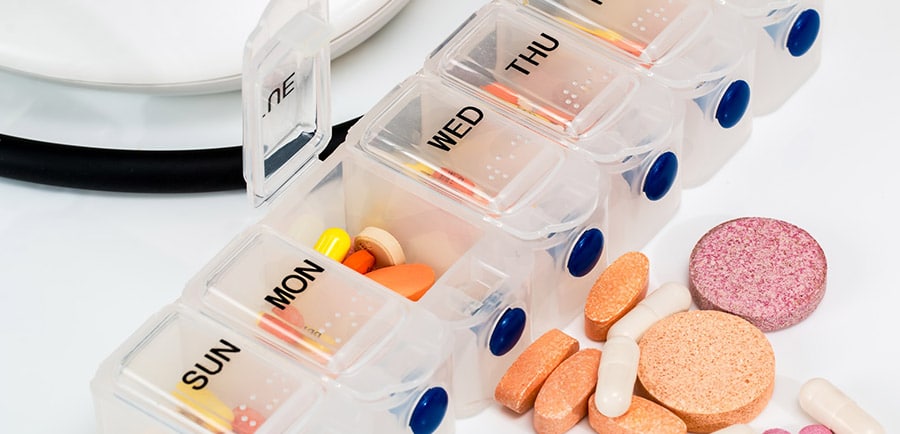These People Don’t Need Nutritional Supplements

Before you pick out your next nutritional supplements, you need to read this...
When it comes to dietary supplements, how do know you really need them?
More importantly, how can you determine if they’re 100% good for you and safe for you and your family?
Many multivitamin companies claim they have the “best supplements” but did you know that the FDA does not regulate supplements the same way they do food and beverages? So how can you know these companies claims are true?
I’m going to take you through the most common nutrient deficiencies, what you should know about supplement regulation, how to know if supplements are right for you, how to choose the best supplements and alternatives for great health.
If you’re considering taking a nutritional supplement it’s important that as a consumer, you have the tools you need to make the right decision for you and your health.
Let’s start with finding out what exactly a supplement is and what exactly it’s intended for.
What is Considered a Dietary Supplement?
Dietary supplements, are products that are intended to be used to supplement the diet.
These can include vitamins, minerals, herbs, enzymes, amino acids, and others.
Supplements can be a vital factor in restoring dependencies within the body that cause degeneration and disease.
These are subsets, whereas conventional foods are found in their whole form.
What’s the Difference - Vitamins vs. Herbs vs. Minerals vs. Metals and More

Nutritional supplements are labeled in different ways depending on the category they fall into.
How do you know which is which and what constitutes a supplement?
Let’s do a quick break down of some common terms related to dietary supplements:
- Vitamins - These are organic compounds essential to the body. They regulate metabolism, help the body with biochemical processes and work with enzymes as coenzymes to assist in the body’s activities. These can either be fat soluble or water soluble. Water soluble vitamins do not stay in the body for as long and usually need to be replaced daily whereas fat-soluble vitamins are stored in the body’s tissue. (This one reason why fat-free diets result in deficiencies).
- Minerals - Used to maintain healthy nerve function, build and feed cells, assist in the formation of blood and bones, serve as co-enzymes and are necessary for the makeup of fluids in the body.
- Metals - Many minerals are also considered metals such as Iron (Fe) and Zinc (Zn) and Silver (Au). Consuming silver alone will turn you blue, but through ionization, it’s used to create colloidal silver which is used to treat infections in the body.
- Herbs - Many herbs have great medicinal properties, but they’re not considered supplements. Herbs are dried plants that are considered to be foods by the FDA.
- Enzymes - There are over 20,000 different enzymes in your cells that aid in chemical reactions in your body such as hearing, feeling, digestion, etc. These pair with co-enzymes like vitamins and minerals that rely on the energy of the enzyme to form other enzymes such as collagen.
Most Common Signs of Dietary Deficiencies
There are many signs and symptoms of deficiencies.
The most common deficiencies among people include:
- Iron
- Iodine
- Vitamin D
- Vitamin B12
- Calcium
- Vitamin A
- Magnesium
These result in:
- Complications with the nervous system
- Excessive fatigue
- Irregular heartbeat
- Anxiety
- Depression
- Headaches
- Memory loss
- Stress
- Insomnia
- Other issues related to bone, muscle, joint and healthy organ function.
The surprising realization is that many people suffer these symptoms on a regular basis.
Are you nutrient deficient without realizing it?
Are Supplements Necessary

It’s likely you’re lacking one or more of the body’s essential vitamins and minerals.
How can you know for sure?
Take this free personal supplement evaluation to find out what vitamins and minerals you may be lacking.
Extensive studies have been done on dietary supplements and the findings have been both shocking and encouraging.
The majority of people would greatly benefit from taking supplements. However, there are some people who do not need them.
These People Do Not Need to Take Supplements
Adequate nutrition, water, exercise, and sunshine remove the need to supplement.
Check out this list to see if you are someone who does not need a dietary supplement.
This list is based on daily nutritional needs.
- Eat high-quality protein in the correct amount and with all the 9 essential amino acids.
- Consume 10 - 12 servings per day of organic, raw fruits and veggies.
- Drink 6 - 8 cups of fresh, purified water per day.
- Have a 50% intake of raw, fresh produce per day.
- Avoid pre-packaged, refined, and processed foods.
- Exercise and engage in physical activities daily.
- Use products that are free from toxins and chemicals.
- Stay away from excessive alcohol, illegal drugs, caffeine, and cigarette smoking.
- Zero family history of degenerative and fatal medical conditions.
- Great at managing stress and live a worry-free, happy life.
Most of us can’t check everything off that list!
On top of everything we’ve covered so far, studies are showing that our foods simply aren’t the same as they once were.

What Does Our Soil Have to Do With Dietary Health?
It’s been found that through crop rotation and constant use of the land, soil depletion is occurring worldwide and heavily affects the U.S.
What does this mean for the nutritional value of even the best foods?
“Because of soil depletion, crops grown decades ago were much richer in vitamins and minerals than the varieties most of us get today” -Scheer, Roddy. Moss, Doug, Dirt Poor: Have Fruits and Vegetables Become Less Nutritious?. 2019
Although a better choice without the use of harsh chemicals, even organic foods are affected by soil depletion.
The FDA Requirements for Supplements
There are major differences between how the FDA labels food and how the FDA labels supplements.
According to the FDA website, these are what you should always be able to find on the Supplement Fact panel:
Serving size, nutrient declaration, (required to list includes calories, fat, saturated fat, cholesterol, sodium, total carbohydrate, dietary fiber, sugars, protein, vitamin A, vitamin C, calcium, and iron when present in measurable amounts, amounts, percent of daily value and other dietary ingredients.
If your supplement is missing its supplement fact panel, they are not meeting the FDA requirements and you should stay away!

What You Should Know About the Dangers of Supplements
It’s been shown that taking supplements aids in optimal health.
They are intended for repair of the cells, the resistance of further cell damage, restoration to health following deficiency, and maintenance for good health.
Check out this study done by Nutrition Journal, October 2007, that concludes the value of supplements to learn more.
So what do you need to know when choosing the right supplement for you?
1.Regulation
“The U.S. Food and Drug Administration (FDA) does not have the authority to review dietary supplement products for safety and effectiveness before they are marketed.” -FDA, Food Resources.
This means that supplements are safe until proven otherwise.
Make sure you obtain the information you need to make a safe decision!
2. Dosage
Each nutritional supplement manufacturer should provide the needed daily amount and dosage recommendation.
More does not mean better and can have adverse effects.
Make sure you are following your daily allowance for vitamins and minerals.

3. Natural
Companies that claim their products to be natural or organic must meet the USDA standard for organic foods.
However, many ingredients are grown in the wild and not on organic farms which makes them eligible to be defined as organic.
Can you Help Yourself With Food
Achieving health through the foods you eat should be your number one goal.
You can greatly help your health by:
Eating a wide variety of healthy fats, proteins, whole grains, fruits and vegetables.
Consuming your vegetables raw, steamed or lightly cook as they lose their nutritional value through cooking.
Consume healthy proteins in the right amounts.
Consume 5-10 cups of raw fruits and veggies per day (preferably locally or personally grown)
Properly store your food to prevent nutrient loss and avoid contamination.
Eat organic foods that meet the USDA organic foods standard.
Do not consume processed foods or foods with additives.
Cut out refined foods like sugars and flours.
However even if you are building health through a variety of whole, organic foods cooked properly, you may still be missing vital nutrients your body needs to build healthy cells.

How Do You Pick The Right Supplement Company
Before you jump in with the first company you come across, it’s important to consider a few things first.
Being selective in who you purchase from will give you more confidence that the product you’re using is going to truly benefit your health.
The Company
It’s very important to research company information before purchasing a supplement.
Reputation
Look into reviews, lawsuits, clinical studies, quality controls and general information involving the company you’re considering purchasing your supplements from.
It’s easier to find information on a company that has been around longer.
You want to choose a company that has been around for a number of years so that you can be assured that their reputation is based on their track record.
Studies
If your dietary supplements aren't being tested then there’s no way to know how they process their products and the safety of them.
Quality Control
Select a company that has run rigorous quality control studies that meet pharmaceutical grade quality controls for their products.
Transparency
Studies, articles, and publications should be made available to the consumer.
If it’s difficult to find information on any chosen company, this is a HUGE red flag.
Publications
Choose a company that has published clinical studies for its products confirming both effectiveness and safety of their product.
Pick a company that has not just one but multiple published clinical studies.

How To Choose High-Quality Supplements
Make sure that your choice supplement company meets the consumer checklist.
A Balanced Formula
Many nutrients work together to assist the other in their effectiveness.
Make sure you read your labels and look for a balanced formula.
Easy Absorption?
Test your supplement by soaking it in water for 30 minutes or less to see if it dissolves within this time frame.
Cell Availability?
Ask the company for peer-reviewed proof. Unbiased, legitimate research, which if the company does not have, shop somewhere else!
What’s the method used for preserving nutrients
The quality of your supplements are affected by how nutrients are preserved.
Sweeteners? Sugars? Artificial colorings?
There’s no need or benefit for sweeteners, sugars or artificial coloring so be sure to examine the labels.

How Long Until You Should See an Improvement
It really depends on what supplement you’re taking and what deficiencies you have.
Your body produces one trillion new cells each day. How quickly the cells in the body replace themselves varies.
The overall consensus is that you can feel and see results from a supplement anywhere from 5 days to three months to a year.
Be sure to do some investigation of your own to see how long it will take to see improvements based on the unique supplement you are using.
What Are The Best Supplement Brands
The best supplements brands are those that follow all the guidelines, regulations and meet customer standards.
They should have a good reputation, perform peer-reviewed - clinical studies on their products and they should be transparent.
Be Healthy Be Wise
Never make a decision based on the hype of advertisement!
Hopefully, now you’ll feel more knowledgeable and confident to make wise choices when it comes to choosing a supplement.
First, find out where you are deficient and what kinds of supplements help to repair and resolve your deficiency. You can use my free healthy scorecard.
Follow the daily recommendations and be sure to investigate each manufacturing company and their practices before you make a decision.
Now that you know what to look for, you can make the best choices for your health.
If you have any questions, please leave them in the comment section below.




